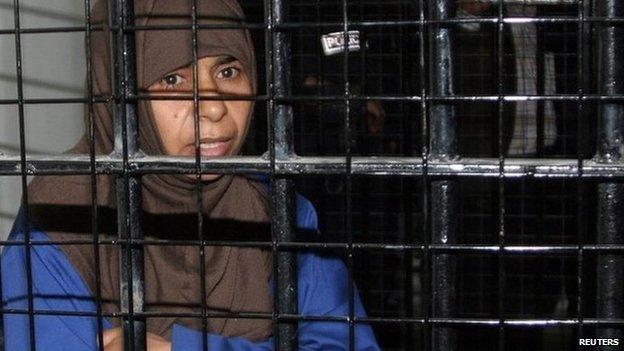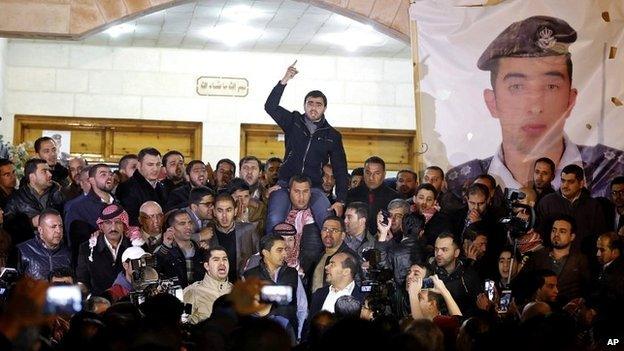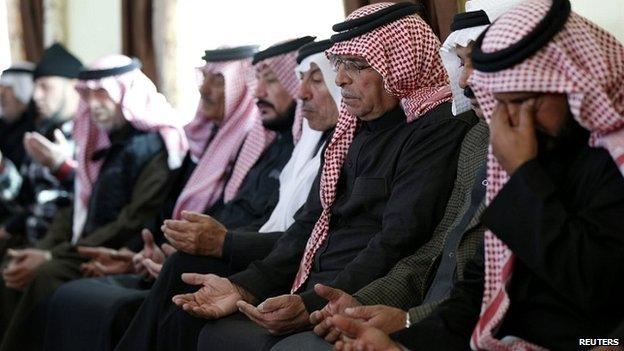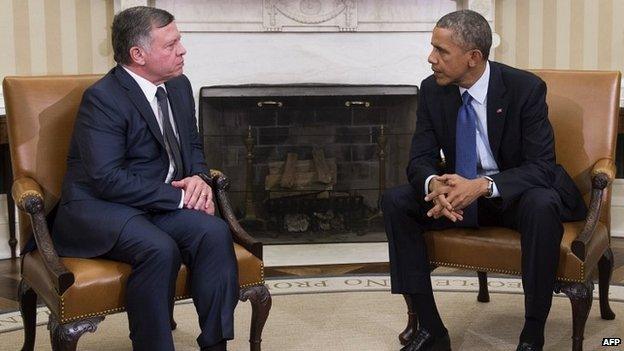Jordan executes convicted jihadists after pilot's death
- Published

Failed suicide bomber Sajida al-Rishawi had been on death row in Jordan for nearly a decade
Jordan has executed two convicts, including a female jihadist, following the killing of one of its air force pilots by Islamic State (IS) militants.
The woman, failed suicide bomber Sajida al-Rishawi, and al-Qaeda operative Ziyad Karboli - both Iraqi nationals - were hanged at dawn, officials said.
The executions came hours after IS posted a video appearing to show pilot Moaz al-Kasasbeh being burned alive.
He was seized after crashing during an anti-IS mission over Syria in December.
Jordan had attempted to secure Lt Kasasbeh's release in a swap involving Rishawi, but IS is believed to have killed him a month ago.
Safi al-Kasaesbeh, Lt Kasasbeh's father: "I demand that the vengeance should be more severe"
The militants initially sought Rishawi's release as part of a deal to free captive Japanese journalist Kenji Goto, but later killed him.
Rishawi had been on death row for her role in attacks in Jordan's capital, Amman, which killed 60 people in 2005. Karboli was convicted in 2008 of killing a Jordanian national.
The two prisoners were executed at 04:00 local time (02:00 GMT), government spokesman Mohammad al-Momani said on Wednesday morning.
'Revenge will be huge'
The BBC's Paul Adams in Amman says talk of an exchange appears to have been a IS tactic to string Jordan along and foster doubt among Jordanians over its role in the US-led coalition.
Jordan vowed an "earth-shattering" response after IS posted a video online appearing to show the pilot standing in a cage engulfed in flames.
One of the leading authorities in Sunni Islam condemned the killing, saying the burning to death of Lt Kasasbeh violated Islam's prohibition on the mutilation of bodies.
In a statement released on Tuesday night, Sheikh Ahmed al-Tayeb, the Grand Imam of al-Azhar University in Egypt, called for the "killing, crucifixion of IS terrorists".

Supporters and relatives of Lt Kasasbeh rallied in Amman to voice their anger at IS militants

Safi al-Kasasbeh, the pilot's father, called on Jordan's government to do more than execute prisoners
Mamdouh al-Ameri, a spokesman for the Jordanian armed forces, said on Tuesday that Lt Kasasbeh had "fallen as a martyr", saying their "revenge will be as huge as the loss of the Jordanians."
Safi al-Kasasbeh, the pilot's father, called for the Jordanian government to do "more than just executing prisoners".
The blood of his son was the blood of the nation, he said, "and the blood of the nation must be avenged."
"I call for [IS] to be eliminated completely," he told reporters on Wednesday.

Analysis: Frank Gardner, BBC Security Correspondent
In addition to the horrific voyeurism of the latest hostage murder video from IS, something else stands out: The total inability of the US and its coalition allies to save hostages from the clutches of IS.
For all its multi-billion-dollar intelligence-gathering agencies, its satellites in space, and its highly trained special operations teams, Washington has been unable to mount a successful hostage rescue mission in IS territory.
So this video is not just a warning to Arab pilots taking part in the US-led air strikes, it is a calculated mockery of coalition impotence to stop them murdering their hostages, slowly, in broad daylight, at a time of their choosing.
Everyone knows their base is in Raqqa in northern Syria and it is no secret that other hostages are still in IS hands.
Efforts may now be increased to find them but an earlier US rescue mission failed and planners will be looking at the long odds against another one having any more success.

Jordan's King Abdullah hailed Lt Kasasbeh as a hero, saying Jordan must "stand united" in the face of hardship.
The king decided to cut short a visit to the US after news of the pilot's death, but he met President Barack Obama on Tuesday evening before flying home.

King Abdullah met with President Obama at the White House before returning home from the US early
Many in Jordan have questioned its role in the air strikes against IS but the two leaders sought to reaffirm their joint resolve to destroy the group.
Meanwhile, the New York Times reported on Wednesday, external that the United Arab Emirates suspended its involvement in the anti-IS air strikes after Lt Kasasbeh was captured in December.
It cites US officials as saying the UAE wants the Pentagon to improve its search-and-rescue efforts in Iraq before it resumes bombing missions.

Timeline: Jordanian pilot held hostage
24 December 2014: Jordanian Lt Moaz Youssef al-Kasasbeh captured by IS after his plane crashes
25 December 2014: Pilot's father urges IS to show mercy
20 January 2015: IS threatens to kill two Japanese hostages unless Japan pays $200m ransom within 72 hours
24 January: IS releases video of Japanese hostage Kenji Goto holding a picture apparently showing Haruna Yukawa's decapitated body
24 January: IS calls for release of Sajida al-Rishawi, an Iraqi militant sentenced to death in Jordan
28 January: Jordan offers to release Rishawi in exchange for Lt Kasasbeh
29 January: Deadline to kill Lt Kasasbeh and Mr Goto expires
31 January: Video released appearing to show Kenji Goto's body
3 February: Video released appearing to show Lt Kasasbeh burnt alive, with Jordanian media suggesting he was killed weeks earlier